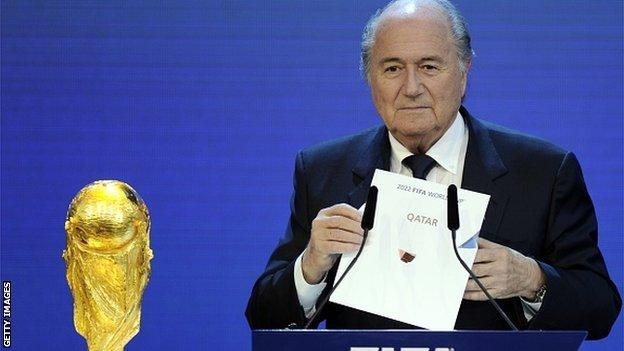Fifa faces more questions after latest World Cup claims
- Published
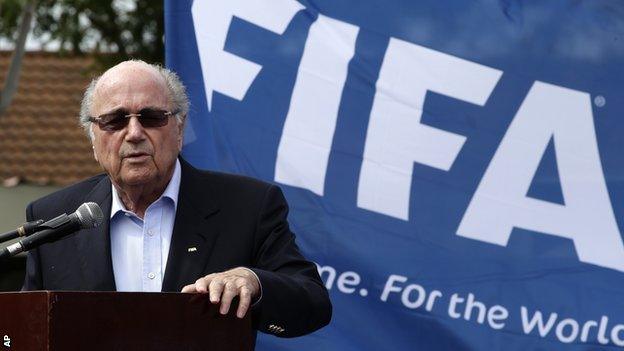
Sepp Blatter will be attempting to go for a fifth term as Fifa president
Just when you thought you had heard it all about Fifa and its handling of the selection process for the 2018 and 2022 World Cups, along comes more.
Just when you might have assumed it could not get any worse, it does.
More intrigue. More suspicion. And more allegations.
The publication by the Culture, Media & Sport Select Committee, external of a submission given to it by the Sunday Times newspaper contains some eye-catching claims.
Not least, that the England 2018 bid and its associates "had commissioned high-level intelligence-gathering and surveillance on the other countries bidding to host the 2018 and 2022 World Cups...the bid paid private companies and individual consultants to spy on its rivals in the run-up to the vote in December 2010".
Later, it is claimed the bid had "received assistance from Britain's official security services to set up surveillance countermeasures because they feared Russia was spying on them when they met with voters to ask them to back the England 2018 bid. The security officials had advised them to lock their phones in lead boxes during such meetings and swept the rooms to make sure they had not been bugged".
It reads like something out of a John le Carre novel.
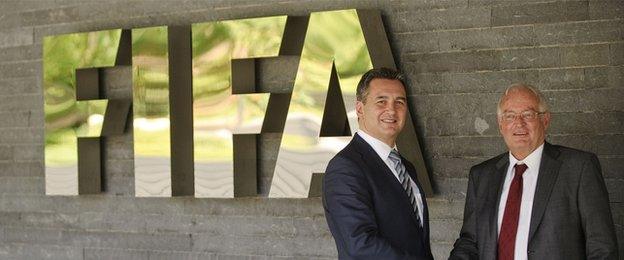
Michael Garcia (left) questioned Hans-Joachim Eckert's report into his two-year inquiry into the World Cup bidding process
So what does all this mean for Fifa? And for Russia and Qatar, whose bids feature prominently in the submission?
After all, a source connected to the England 2018 claims the following: "We did have intelligence that states paid bribes to Fifa members…The [England] bid was never going to win because of the corruption on the other side."
While these are new claims, the sense is that this is the continuation of a theme. Many observers believe that Fifa stopped functioning as a credible governing body a long time ago, and that the way the hosts of the 2018 and 2022 World Cups were chosen was entirely flawed. This, for many, will merely reinforce that suspicion.
Both Russia and Qatar, who four years ago won the right to stage the 2018 and 2022 World Cups respectively, have always denied any wrongdoing, and their bids have recently been cleared by Fifa's ethics chief after a two-year investigation (albeit one that lost much credibility after a summary of its findings was disowned by the investigator himself).
However, football's world governing body has still faced calls to re-run the voting contest.
Whether it is the stifling heat of the gulf state's summer, the treatment of migrant labourers or allegations of corruption in the bidding process, Qatar in particular has been under siege from critics who say it should never have been chosen to host the tournament in the first place.
World Cup bid: Greg Dyke wants Garcia report publication
Fifa has become used to fighting off accusations about votes being sold in World Cup bidding races, members of its executive committee using office for personal gain, and collusion between bids.
So expect more of the same, especially when the Sunday Times itself admits: "While we have made efforts to corroborate the information...it has been impossible to verify many aspects of the intelligence which we are told the England 2018 team compiled independently."
The newspaper's information certainly makes for fascinating reading, but appears to fall a long way short of the clear proof or solid evidence that would force Fifa into a sensational revote.
Even though the Football Association admits that it did indeed engage with "media and corporate affairs consultants engaged on a confidential basis to gather intelligence", the Sunday Times' submission relies on claims, recollections and rumours from anonymous sources, about a secret database that it has not seen.
As one England 2018 source tells the newspaper: "A lot of it was just outlandish stuff you hear on the circuit..." The same source, according to the submission, "said that although the information was 'fascinating' it was just intelligence and, therefore, not enough to prove corruption conclusively on its own."
To be clear, the Sunday Times is only able to publish many of these fresh allegations because a parliamentary committee has posted them on its own website. So the newspaper and anyone else who repeats the claims are protected by parliamentary privilege.
It is reminiscent of 2011 when former FA chairman Lord Triesman used parliamentary privilege to allege that four senior Fifa officials had asked for inducements to vote for England.
Four years of controversy |
|---|
2 December 2010 - Russia and Qatar are chosen to host the 2018 and 2022 World Cup. |
4 October 2013 - Fifa agrees to set up a taskforce to look into alternative dates for the 2022 World Cup in Qatar |
1 June 2014 - The Sunday Times alleges that former Fifa vice-president, Mohamed bin Hammam, paid £3m to football officials in return for support for the Qatari bid |
5 September 2014 - The report into the 2018 and 2022 World Cup bidding process is submitted to Fifa by Michael Garcia |
13 November 2014 - Fifa release a 42-page summary of the Garcia report which clears Russia and Qatar of corruption |
13 November 2014 - Garcia claims the summary of his own report is "materially incomplete" and contains "erroneous representations" |
20 November 2014 - Garcia and Fifa ethics judge Hans-Joachim Eckert agree to release the full copy of the report to the organisation's compliance chief, Domenico Scala |
This time though we do not know who exactly is making the allegations. So do not expect this to finally prove the tipping point that means that Russia and Qatar are about to lose the right to host the World Cup, or that Sepp Blatter is now certain to be denied a fifth term as Fifa president.
In fact, just as these latest allegations went to press, Blatter appeared stronger than ever, reportedly securing the full support of the Asian Football Confederation at its 60th anniversary celebrations in Manila.
Blatter may have lost all credibility here in the UK. He may have lost the support of Uefa ahead of next year's presidential election. But elsewhere it seems he has no such concerns.
And no doubt at Fifa House in Zurich, these latest allegations will be dismissed by many as just another conveniently-timed attempt by a negative English media to deflect attention from its country's own failed bid.
Having said all that, these latest allegations do raise some very serious questions.
Why exactly was the England bid spying on its rivals, and how comfortable should we be with that?
Does the database of intelligence exist, where is it, and what form does it take?
Does it contain any clear evidence to back up some of the sensational claims of vote-selling and collusion referred to, especially when it comes to Russia and Qatar?
Why exactly has it taken until now for these claims to come to light?
Is it true England 2018 "agreed a collusion pact with the South Korea 2022 bid on the eve of the secret ballot" in a breach of Fifa's rules?
Will these allegations be of interest to Michael Garcia - the American lawyer who last week opened formal proceedings against "a number of individuals" including three Fifa Exco members following his disputed investigation into the bidding process?
Could they interest the Serious Fraud Office as it considers whether to launch a full criminal investigation in the UK - and whose ability to do so will be raised in an adjournment debate in the Commons on Monday?
It seems inevitable that latest allegations will heap yet more scrutiny on those that run the sport. They will no doubt lead to more demands that the full findings of Garcia's investigation are published. More calls by some for a boycott of the World Cup, and for a breakaway from Fifa.
More expectations that a realistic challenger - most likely Prince Ali of Jordan - will stand against Blatter next year. And that perhaps most importantly, more sponsors will turn their backs on an organisation and showpiece event that appear more tarnished than ever.
This week on a visit to Belfast, Fifa secretary-general Jerome Valcke expressed his hope that football could soon finally move on from the turmoil and tumult of recent weeks. That it might finally achieve closure after so many months and years of damaging allegations of corruption.
Today, such closure seems a long, long way off. This tawdry saga shows no sign of abating, and it shames the game - and those that run it.
- Published30 November 2014
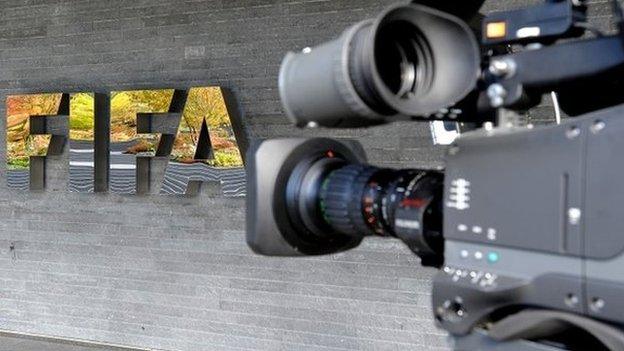
- Published13 November 2014
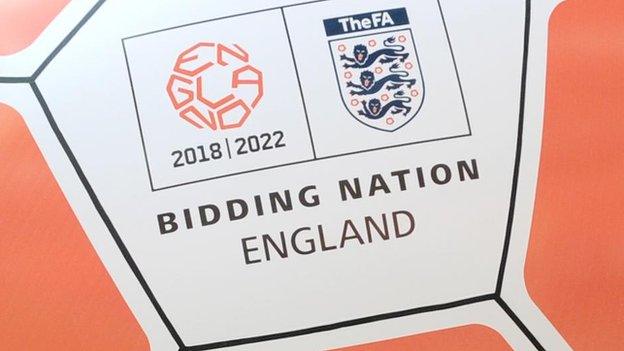
- Published20 November 2014
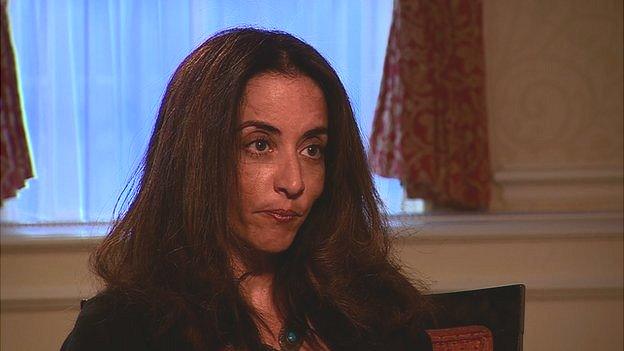
- Published13 November 2014
- Published13 November 2014
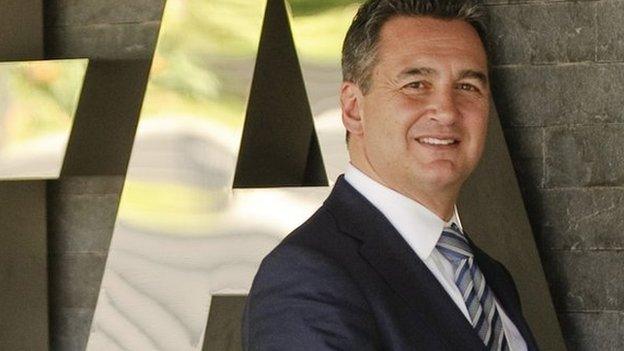
- Published26 November 2014
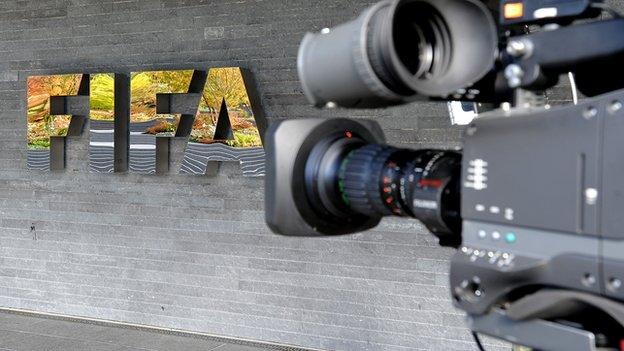
- Published26 November 2014
